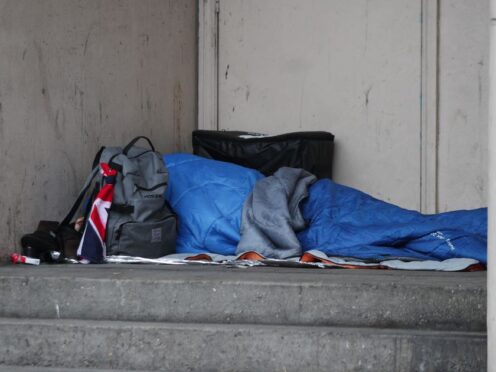
Billions could be added to the economy through investment in social housing, according to a new report which comes as the Chancellor has been warned of the “dire situation” facing homelessness support services that urgently need funding to stay afloat.
Dozens of England’s leading homelessness organisations, services and partners have written to Jeremy Hunt to plead their case ahead of the spring Budget.
It comes in the same week as a report for the National Housing Federation (NHF), which is one of the signatories to the letter to the Chancellor, suggested the next government could add more than £50 billion to the economy by building 90,000 social homes.
The latest statistics for rough sleeping and households living in temporary accommodation are due to be published on Thursday, and homelessness organisations are predicting “another sharp rise”.
Their letter stated: “We are writing to you as a collection of 37 of England’s leading homelessness organisations, services and partners to make you aware of the dire situation facing providers of homelessness services and to call on you to release funding in the upcoming
spring Budget to help services stay afloat.”
While they acknowledged Government funding in recent years, they said two-thirds of homelessness accommodation providers have reported that their services are no longer financially viable “due to lack of inflationary increases in commissioned and grant-funded projects”.
The poll by Homeless Link of 120 providers also suggested just over a third (36%) have already reduced their services to meet financial pressures, while four in 10 (41%) risk having to close their services soon.
The organisations noted the pressures on council budgets, some of which have “enormous deficits”, and said: “Support services are shrinking while homelessness surges.”
They wrote: “More and more people are being pulled into homelessness without the support of expert service providers to turn to, at huge risk to their physical and mental health and placing significant extra strain on emergency and health services.
“This is a disaster, which the Government must address immediately.”
The social housing report, carried out by the Centre for Economics and Business Research (CEBR) on behalf of the NHF and Shelter, predicted that investment in social housing could directly support nearly 140,000 jobs in the first year alone.
It stated that within three years it would have paid for itself and could return some £37.8 billion to the economy, mainly by boosting the construction industry.
The report said the new social homes would also generate billions in savings for the taxpayer on housing benefit, save on costs to the NHS from poor housing conditions and in savings from the reduction in homelessness.
The analysis, which researchers said used official government statistics, industry reports and internal data shared by Shelter and the NHF, shows that building more social homes is a “win-win solution”, the organisations said.
Shelter chief executive Polly Neate said: “Homelessness is a political choice, with a simple solution. Building 90,000 social homes a year will not only end the housing emergency, but, due to the wider economic benefits it brings, it will pay for itself within just three years.
NHF chief executive Kate Henderson said: “This research shows not only that the housing crisis can be solved, but that this can be done in a way that will save the taxpayer money, boost jobs and bring huge benefits to the wider economy.”
Labour’s Matthew Pennycook, shadow housing and planning minister, accused the Government of having “created a housing emergency with more than one million people waiting for a social home”.
He vowed that his party will “get Britain building and deliver the biggest boost to affordable, social and council housing for a generation” should it win the next election.
A Government spokesperson said: “We are determined to end rough sleeping for good and are working hand-in-hand with the homelessness sector and other partners to make sure people have a roof over their head and the support to rebuild their lives.
“We are spending £2 billion to tackle homelessness and rough sleeping, and last month announced a further £4 million to local authorities to help them with rough sleeping challenges typical to the winter period.
“Our commitment to building more homes and boosting social housing supply remains, and our £11.5 billion Affordable Homes Programme will deliver thousands more affordable homes to rent and buy across the country.”

Enjoy the convenience of having The Sunday Post delivered as a digital ePaper straight to your smartphone, tablet or computer.
Subscribe for only £5.49 a month and enjoy all the benefits of the printed paper as a digital replica.
Subscribe